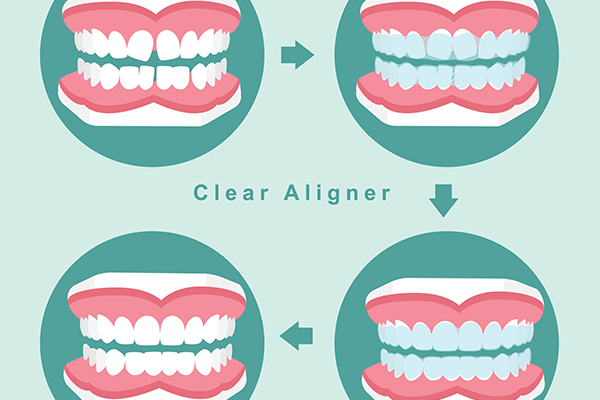


 Orthodontics is a field of dentistry that improves the function and appearance of the teeth and/or jaws. In most cases, orthodontics uses gentle, constant pressure to reposition the teeth and the structures that support said teeth.
Orthodontics is a field of dentistry that improves the function and appearance of the teeth and/or jaws. In most cases, orthodontics uses gentle, constant pressure to reposition the teeth and the structures that support said teeth.
If you are thinking about improving your smile with orthodontic treatment, keep reading. This guide is an overview of the orthodontics process, from start to finish.
A brief explainer on orthodontics
Dentists almost always recommend orthodontic treatment to patients who have malocclusions (bad bites). Depending on the type and severity of the patient’s condition, a dentist will recommend one or more of the following:
- Braces, which reposition the teeth with precise, gentle, and constant pressure.
- Rubber bands and power chains, which complement the action of braces.
- Clear aligners, which are custom transparent teeth trays that work like braces.
- Retainers, which are worn after braces or aligners have realigned the teeth and prevent the teeth from shifting back to their old, undesirable positions.
- Face masks and orthodontic headgear, which guide the growth of the upper or lower jaws, reshaping them in the process.
- Palatal expanders, which reshape and encourage the growth of the upper jaw.
- Orthotic surgery, which can correct a jaw injury or malformation.
- Targeted anchorage devices, which are small, temporary dental implants that apply targeted pressure on individual teeth.
1. Initial consultation
At this stage, the patient tells their dentist why they want orthodontic treatment. The dentist will ask questions about the patient’s daily experiences with their malocclusion. They will also perform a visual exam of the patient’s mouth. Lastly, the dentist will go through the client’s dental records, which the patient should provide to make the most out of their initial consultation.
2. Patient evaluation
Next, the dentist will perform an in-depth exam to get a complete picture of the teeth and structures that support them. The exam may include medical imaging like X-rays and CT scans. Information from patient evaluation allows the dentist to craft a custom treatment plan.
3. Creation of the treatment plan
The dentist now identifies the ideal orthodontic treatments for their patient. They plot the progress that they anticipate seeing in their patient’s bite over time. Sometimes, the dentist will recommend procedures like tooth extraction or corrective surgery as part of a larger treatment plan. They may slot the procedure at the beginning of treatment or in the middle of it.
4. Crafting and fitting of orthodontic appliances
Once the dentist settles on a course of treatment, they will take an impression, or mold, of the patient’s teeth. The mold becomes the basis for the patient’s custom orthodontic appliance. A dental technician will use the impression to create an appliance that fits snugly over the patient’s teeth.
The dentist will then fit the finished product onto the patient’s teeth. They will instruct the patient on how to live life with an orthodontic appliance in their mouth.
5. Monitoring and adjustment of orthodontic appliances
As treatment takes effect, the dentist will chart their patient’s progress and make changes where necessary. This stage is continuous, only coming to an end once the teeth and jaws are in optimal alignment. The dentist will declare the end of orthodontic treatment once the teeth settle into their new locations with no risk of reversal.
Level up your smile and your oral health
Orthodontics may be the way to upgrade your smile and improve your oral health. Get in touch with us to find out how your life could be improved with top-notch care from our dentist. Their vast experience in orthodontics could serve you well.
Request an appointment or call Thanasas Family Dental Care at 248-260-2878 for an appointment in our Troy office.
Recent Posts
In recent years, clear aligners have become more popular due to their benefits. Many people choose aligners because they are comfortable and removable. Others also appreciate that aligners offer a discreet way to straighten teeth. The appliances can effectively move your teeth into a more aesthetically pleasing position. Read on to find out more about…
There are many advantages of using clear aligners, but some patients might mistakenly believe these are hard to care for. Not caring for them correctly might result in embarrassment about the mouth. It could happen when the bacteria buildup or the aligners become discolored. The good news is there is no need for shame during…
It takes dedication to wear clear aligners often enough, but patients need to know what to do afterward. However, without the right after-treatment care, the teeth might begin to shift. That undoes the work of the clear aligners. That means the patient will need to have a retainer after the aligners come off.A retainer can…

